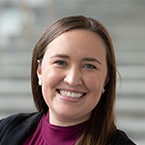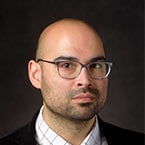AACR Career Development Award in Lung Cancer Research
The AACR Career Development Award in Lung Cancer Research have been established to encourage and support early-career investigators to conduct lung cancer research and establish successful careers in this field. The proposed project may be basic, translational, clinical, or epidemiological in nature and must have direct applicability and relevance to lung cancer.
2023 Grantees

Research
Lung adenocarcinoma is the most common subtype of non-small cell lung cancer and remains a leading cause of cancer-related mortality. Recent work using single-cell transcriptomic and epigenomic technologies has demonstrated the expansive heterogeneity and plasticity of lung cancer cells. Yet, there is a limited understanding of the mechanisms that drive lung cancer heterogeneity and therapeutic vulnerabilities introduced during this cellular diversification process. Dr. LaFave has previously shown that transformation of alveolar type 2 cells with KrasG12D and deletion of p53 leads to a continuum of cell states reminiscent of developmental trajectories in lung specification and other cellular identities. This project aims to study whether chromatin plasticity following oncogenic transformation emerges due to disruption of underlying lineage-specifying transcription factor programs. These studies will use organoid modeling and epigenomic profiling to uncover the mechanisms that drive intratumoral heterogeneity in lung tumors and identify new therapeutic strategies to target these programs.
Biography
Dr. LaFave is a cancer biologist with a long-standing interest in studying chromatin biology. She received her doctorate in cancer biology at Gerstner Sloan Kettering Graduate School in 2015. Funded by a Damon Runyon Postdoctoral Fellowship, Dr. LaFave completed her postdoctoral training at Massachusetts Institute of Technology and Harvard University. Dr. LaFave is currently an assistant professor in the Department of Cell Biology at Albert Einstein College of Medicine and a member of the Montefiore Einstein Cancer Center. Her independent research group uses evolving epigenomic technologies and cancer models to dissect chromatin-mediated mechanisms that facilitate lung cancer initiation and progression.
Acknowledgement of Support
“I am incredibly grateful to receive a 2023 AACR Career Development Award in Lung Cancer Research to fund our work studying mechanisms that facilitate chromatin plasticity. As an early career investigator, this award is invaluable to support our research efforts to identify new therapeutic rationales in lung cancer.”

Research
FOXM1 is expressed in 90% of lung cancer tumors, making it an attractive therapeutic target. Recent work has highlighted the promise of engineering a specific T cell receptor into recipient T cells for therapeutic purposes in a variety of solid tumors. Dr. Reuben hypothesizes that epitopes of FOXM1 give rise to immunogenic tumor antigens, which can be effectively targeted by T cell engineering. He aims to develop a library of T-cell receptors targeting FOXM1 epitopes presented on the 10 most prevalent HLA alleles, which could be used to treat the overwhelming majority of lung cancer patients in the United States and across the world.
Biography
Dr. Reuben obtained his doctorate at the University of Montreal in Canada, studying the interplay between iron metabolism and antigen processing and presentation. He then pursued a postdoctoral fellowship at MD Anderson Cancer Center under the mentorship of Dr. Jennifer Wargo, studying tumor heterogeneity and mechanisms of response and resistance to targeted immunotherapy in melanoma. Since 2018, he has held a faculty appointment in the Department of Thoracic/Head & Neck Medical Oncology where his lab focuses on the development of novel immunotherapies for the treatment of lung cancer.
Acknowledgement of Support
“Our team is truly honored to receive a prestigious AACR Career Development Award in Lung Cancer Research. This award will allow us to expand our cell therapy efforts and to build a library of T cell receptors with the potential to treat hundreds of thousands of lung cancer patients.”